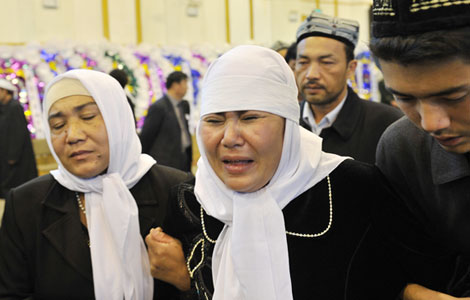Dream, sweet dream
Updated: 2013-04-30 07:49
By Li Yang (China Daily)
|
||||||||
|
Students at a primary school in Fuyang, Anhui province, learn how to improve sleeping postures. Wang Biao / Provided to China Daily |
|
A hospital in Xiangyang of Hubei province teaches patients how to do pillow exercises to improve sleep quality. Gong Bo / Provided to China Daily |
|
Children at a kindergarten in Bozhou, Anhui province, study the correct postures for sleep. Liu Qinli / Provided to China Daily |
How are Chinese people sleeping at night? Not well, according to the nation's first sleep index, published by the Chinese Medical Doctor Association on March 19, Li Yang reports
The report investigated thousands of residents in 20 cities, 20 counties and 20 villages from November to December in 2012 and found that the overall sleep quality among Chinese people is not high. One important cause is that most Chinese do not have awareness of the importance of healthy sleep, and fewer still know how to scientifically improve sleep quality.
The average sleep time of a Chinese person is eight hours and 50 minutes each day, but at least half of those surveyed report feeling tired after getting up. The national average sleep score is 64.3 on a scale of 100.
"Chinese people's sleeping time is not short. However, their sleep quality is quite low," said Mu Yue, president of Horizon Studies and Consulting Company, a partner of the association.
"Chinese people need to improve their sleep quality by changing their lifestyle and paying attention to some factors that are necessary for good sleep."
The research in Beijing supports his view. In the capital city, people get up at 6:33 am and go to bed at 10:15 pm on average.
However, the long amount of time spent in bed does not translate necessarily into good sleep. Beijing ranked third among 20 cities in terms of difficulty falling asleep. More than 80 percent of Beijing residents complain that stress affects their sleep. Difficulty breathing and nightmares are also common problems.
Cao Jidong, an office clerk in Beijing, said: "I live in the east suburb of Beijing and work in the west second-ring road of the city. It takes me two hours total to go to my office from my home by bus and subway. To ensure that I arrive in the office at 8:30 am, I have to leave home at 6 am. My work ends at 6 pm. When I get home at around 8:30 pm, I feel too tired to talk. I sleep in the subway and in bed."
But people can still sleep well despite a heavy workload if they know how to properly cope with stress and create the necessary conditions for good sleep, according to the association.
"I now understand how precious and wonderful sleep is. Most of the time, I take a short nap after I come back from school, and at night I normally go to bed at 10 pm," said Penny Lau, an English teacher from Malaysia who now works in Beijing.
"And when I lie in bed, I normally don't go to sleep immediately. I think and dream until I fall asleep. And because I have more than enough sleep at night, I feel very refreshed throughout the whole day."
The Chinese Preventive Medicine Association's Internet survey identified a lack of deep sleep as the main cause for low-quality sleep.
Both of the medical associations warn that using a computer or cell phone before sleep not only prevents one from falling asleep but also affects the overall sleep quality because the artificial lights stimulate optic nerves and the brain.
Research shows that 14 percent of Chinese people go to sleep after midnight. Some 43.2 percent of them play computer games immediately before sleeping, and 67.1 percent urban residents use cell-phones and computers before going to bed.
"I go to bed at 11 pm and play with my iPhone until 1 am and then get up at 7:30 am. I have been used to this lifestyle since my college days," said Liu Qijing, 26, a marketing assistant at a telecommunications company in Shenzhen, of Guangdong province.
"I know it is harmful to my health, and I feel the negative effects already, but it is very difficult to change these life habits."
Liu is one of the 70 percent of Chinese Internet users surveyed by the preventive medicine association who reported having sleep disorders.
Many conclusions can be drawn from the report by the doctors association based on comparisons among different places and groups of people.
"Our research results indicate people in the south and the west of China sleep better than their northern and eastern counterparts. Rural people sleep better than urban residents, male better than female, the single better than the married, and people with lower education backgrounds sleep better than those who are more educated," said Qin Xiaoming, vice-chairman of the association.
An example of this trend is Zhang Xianzhen, 91, a farmer in Wuhe county of Anhui province.
"I still live the life of a farmer. I work and do physical exercise every day now. I don't need so much sleep- from 10 pm to 4 am the next morning," Zhang said.
"I wash my feet with hot water before going to bed almost every night. I have done it for 30 years. It is very helpful. Sleep has never been a problem in my life, except during the Land Reform in early 1950s and the 'cultural revolution (1966-1976)' when I was criticized as a former land-owner before 1949. I did not expect I could have such a happy life now. What else can I ask for?"
His son, Zhang Wei, 49, a veteran investment bank manager working in Nanjing of Jiangsu province, has a different view of sleep.
"Sleep is a terrible experience," the younger Zhang said.
"I have so many problems to solve each day. I force myself to lie in bed sometimes. But the more I do so, the more difficult it is for me to sleep. I always feel dizzy the next morning. I hope I can earn some money in several years and quit the job.
The media has created a false image that associates sleeping less with success, which is dangerous and misleading, said Han Fang, chairman of the Chinese Sleep Research Society.
"More than 1 million Chinese die of heart attacks each year, 30 percent of whom pass away in their sleep," Han said.
"People having sleep disorders must go to see a doctor for professional treatment, especially those with hypertension and heart illnesses. Everyone should pay attention to developing healthy sleep habits to protect their physical and mental health."
She says that 38 percent of Chinese have sleep disorders compared to the world average of 27 percent.
"There are more than 80 kinds of illnesses related to sleep orders, which should not only be solved through medical means but also social and psychological methods," Han said.
Han recommends that people with sleep problems regularly exercise but not right before sleep and find more ways, such as singing, dancing and talking with other others, to relieve stress. Someone who successfully manages one's own sleep is also a good manager of time and stress, she said.
Waruna Chandrakeerthi, a man from Sri Lanka in his 40s who is now studying at the Communication University of China in Beijing, agrees with Han's suggestion.
"I don't like to work at night. I prefer to do my all work in the daytime. Nighttime is for sleep. Even small birds know it. To fall asleep within minutes and have a sound sleep like a baby, you should have a calm and quiet mind," Chandrakeerthi said.
"As a Buddhist, I know we are suffering. But, I try to keep my mind calm. For this, you don't need to go to a dedicated meditation center. You can do this while you are walking, while you are having a daily shower. There are so many ways to tame your mind. If you take your all troubles seriously and walk around with them, you definitely go to bed with them too."
The report from the doctors association suggests Chinese people should attach more significance to creating a favorable environment for sleep. Environmental conditions, such as temperature, noise, light and bed, play an important role in people's sleep and deciding their sleep quality.
Chun Tian, 28, a broadcaster at a radio station in Beijing said she has learned how to create a good sleep environment.
"I always fall asleep at 11 pm and wake up at 7am the next morning," she said.
"I often change the pillows and put on new bed sheets to give myself a new mood before falling asleep. Luckily, I live in a very quiet residence community. My neighbors do not create noise, and there are no environmental factors that disturb my sleep."
According to the World Association of Sleep Medicine, healthy sleep habits include establishing a regular bedtime and wake-up time and that daytime sleep should not exceed 45 minutes. People should avoid stimulating their nerves and stomachs with alcohol, caffeine, tobacco, and spicy or sugary foods and drinks for four hours before going to bed.
Lastly, it is recommended that beds only be used for sleep or sex and not for work or general recreation.
(China Daily 04/30/2013 page7)
Most Viewed
Editor's Picks

|

|

|

|

|

|
Today's Top News
Three buried after lab explosion
Willem-Alexander ready to be Dutch King
Can earthquakes be predicted?
City unites to say farewell
Beauties turn entrepreneurs
Small stores rely on new retail revolution
Flooding season nears in Ya'an
Taobao creates job specifications
US Weekly

|

|

















